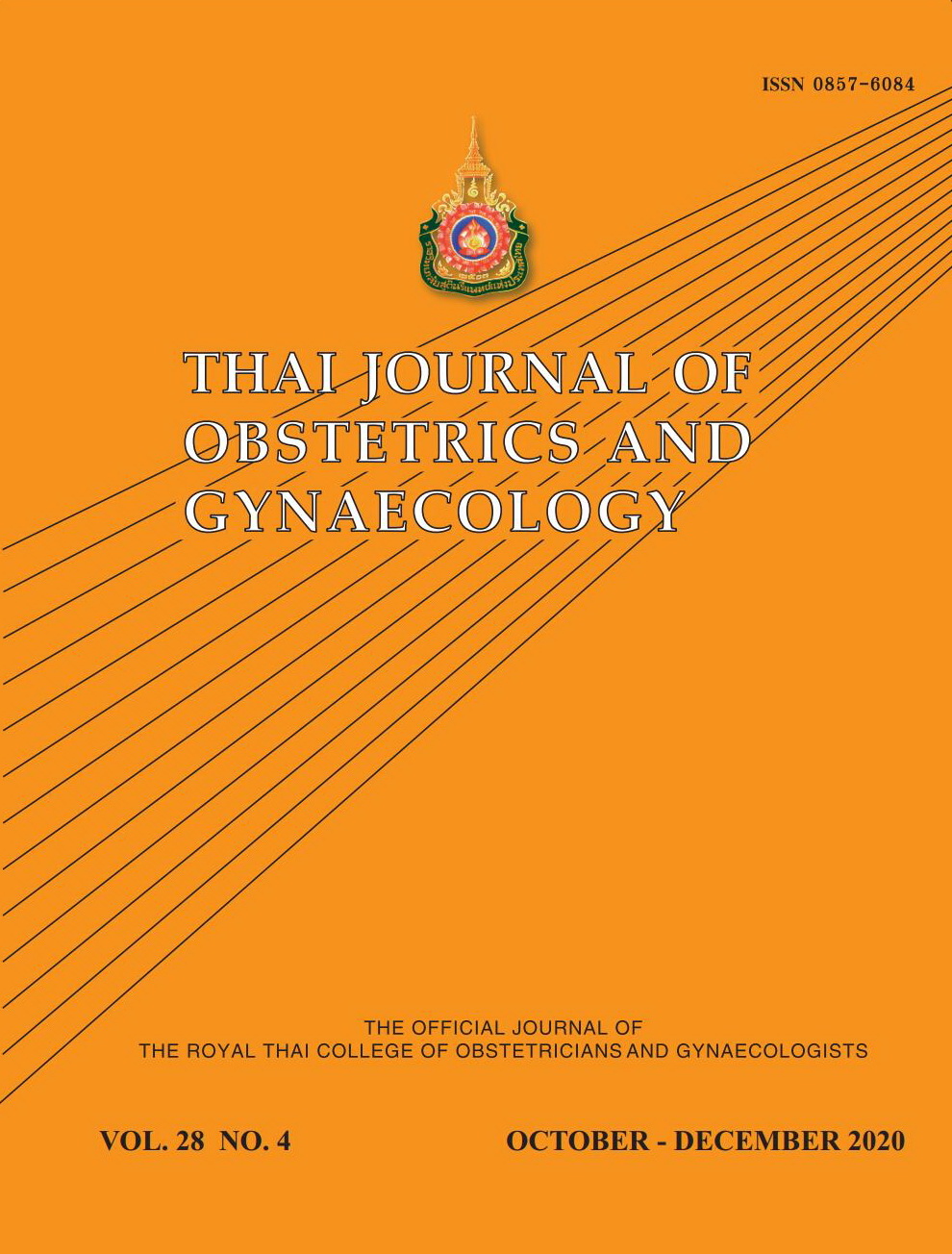Factors Affecting the Decision to Participate in Down Syndrome Screening of Pregnant Women at HRH Princess Maha Chakri Sirindhorn Medical Center
Main Article Content
Abstract
Objectives: To evaluate the factors which affect Thai pregnant women’s decision to participate in prenatal Down syndrome (DS) screening, including their knowledge and attitudes.
Materials and Methods: An analytic cross sectional study of 326 self-administered questionnaires from Thai pregnant women who attended their first antenatal care clinic at HRH Princess Maha Chakri Sirindhorn Medical Center (MSMC) between June and December 2018 were collected. The participants’ knowledge and attitudes on DS and DS screening tests, including their acceptance in prenatal DS screening, were examined. Factors which affected their decision to whether or not participate in screening were also evaluated.
Results: The mean age of the participants was 29.07 ± 5.62 years. Regarding their knowledge on DS, 30.7% of the participants were classified as having good knowledge. However, only 7.4% of the participants were classified as having good knowledge on prenatal DS screening. The percentages of the participants with positive, neutral and negative attitudes on DS and DS screening are 12.9%, 42.9% and 44.2%, respectively. Multivariate logistic regression revealed that pregnant women with an education level of bachelor degree or higher and familial income of >30,000 Baht per month are more likely to accept DS screening, but these did not reach statistical significance. Most participants (297/326, 91.1%) in our study agreed to participate in DS screening, with the majority (116/297, 35.6%) selecting integrate test. Also, most agreed that the cost of screening test should not exceed 5,000 baht and the test should be done in general provincial hospital. Over half of the participants (179/326, 54.9%) believed that pregnant women’s personal health coverage should be responsible for the cost.
Conclusion: An education level of bachelor degree or higher and familial income of >30,000 baht per month are potential factors associated with the pregnant women’s decision to accept DS screening.
Article Details
References
Cunningham FG, Leveno KJ, Bloom SL, Dashe JS, Hoffman BL, Casey BM, et al. Genetics. Williams Obstetrics. 25th ed. New York: McGraw-Hill 2018:253-7.
Wasant P, Boonyawat B, Tritilanunt S, Vatanavicharn N, Sathienkijakanchai A, Ratanarak P, et al. Factors influencing development of Down Syndrome Children in the first three years of life: Siriraj experience. J Med Assoc Thai 2008;91:1030-6.
Palomaki GE, Lee JE, Canick JA, McDowell GA, Donnenfeld AE. Technical standards and guidelines: prenatal screening for Down syndrome that includes first-trimester biochemistry and/or ultrasound measurements. Genet Med 2009;11:669-81.
Foley KR, Taffe J, Bourke J, Einfeld SL, Tonge BJ, Trollor J, et al. Young people with intellectual disability transitioning to adulthood: do behavior trajectories differ in those with and without Down syndrome? PLoS One 2016;11:e0157667.
Pruksanusak N, Suwanrath C, Kor-anantakul O, Prasartwanakit V, Leetanaporn R, Suntharasaj T, et al. A survey of the knowledge and attitudes of pregnant Thai women towards Down syndrome screening. J Obstet Gynaecol Res 2009;35:876-82.
American College of Obstetricians and Gynecologists. ACOG Practice bulletin No. 163: Screening for fetal aneuploidy. Obstet Gynecol 2016;127:123-37.
Pop-Tudose ME, Popescu-Spineni D, Armean P, Pop IV. Attitude, knowledge and informed choice towards prenatal screening for Down Syndrome: a cross-sectional study. BMC Pregnancy Childbirth 2018;18: 439-46.
Wilson KL, Czerwinski JL, Hoskovec JM, Noblin SJ, Sullivan CM, Harbison A, et al. NSGC practice guideline: prenatal screening and diagnostic testing options for chromosome aneuploidy. J Genet Couns 2013;22:4-15.
Chiang HH, Chao YM, Yuh YS. Informed choice of pregnant women in prenatal screening tests for Down’s syndrome. J Med Ethics 2006;32:273-7.
Rostant K, Steed L, O’Leary P. Survey of the knowledge, attitudes and experiences of Western Australian women in relation to prenatal screening and diagnostic procedures. Aust NZ J Obstet Gynaecol 2003;43:134-8.
Fumagalli S, Sofia P, Nespoli A, Locatelli A, Colciago E. Variables Affecting the Decision Making to Uptake Prenatal Testing. Insights Reprod Med 2017;2:1-7.
Reed AR, Berrier KL. A qualitative study of factors influencing decision-making after prenatal diagnosis of Down syndrome. J Genet Counsel 2016;26:814-28.
Gitsels van der Wal JT, Verhoeven PS, Mannien J, Martin J, Reinders HS, et al. Factors affecting the uptake of prenatal screening tests for congenital anomalies, a multicenter prospective cohort study. BMC Pregnancy Childbirth 2014;14:264.
Devers PL, Cronister A, Ormond KE, Facio F, Brasington
CK, Flodman P. Non-invasive prenatal testing/non invasive prenatal diagnosis: the position of the national
society of genetic counsellor. J Genet Couns 2013;22: 291-95.
Manopunya M, Wanapirak C. Thai pregnant women knowledge and attitudes about maternal serum screening for Down syndrome. Thai J Obstet Gynaecol 2008;16:163-71.
Choi SS, Chan LW, To WW. Pregnant Women’s Attitudes to and Knowledge of Non-invasive Prenatal Testing in Down Syndrome Screening in Hong Kong. Hong Kong J Gynaecol Obstet Midwifery 2014;14:43-50.
Nakatsuka M, Mikamo S. Knowledge and Attitudes toward Non-invasive Prenatal Testing among Pregnant Japanese Women. Acta Med Okayama 2015;69:155-63.
Yamane, T. Statistics: An Introductory Analysis. 3rd ed. New York: Harper and Row Publication 1973.
Van den Berg M, Timmermans DRM, Kleinveld JH, Garcia E, van Vugt JMG, van der Wal G. Accepting of declining the offer of prenatal screening for congenital defects: test uptake and women’s reasons. Prenat Diagn 2005;25:84-90.
Lewis C, Hill M, Chitty LS. A qualitative study looking at informed choice in the context of non-invasive prenatal testing for aneuploidy. Prenat Diagn 2016;36:875-81.
De Jong A, Dondorp WJ, De Die-Smulders CEM, Frints SGM, de Wert GMWR. Non-invasive prenatal testing: Ethical issues explored. Eur J Hum Genet;18:272-77.
Menezes M, Meagher S, da Silva Costa F. Ethical considerations when offering non-invasive prenatal testing. Rev Bras Ginecol Obstet 2013;35:195-8.
Pattanaphesaj J, Tonmukayakul U, Teerawattananon Y. Cost-benefit analysis of prenatal screening and diagnosis for down syndrome in Thailand. J Health Sci 2012;21:667-84.


